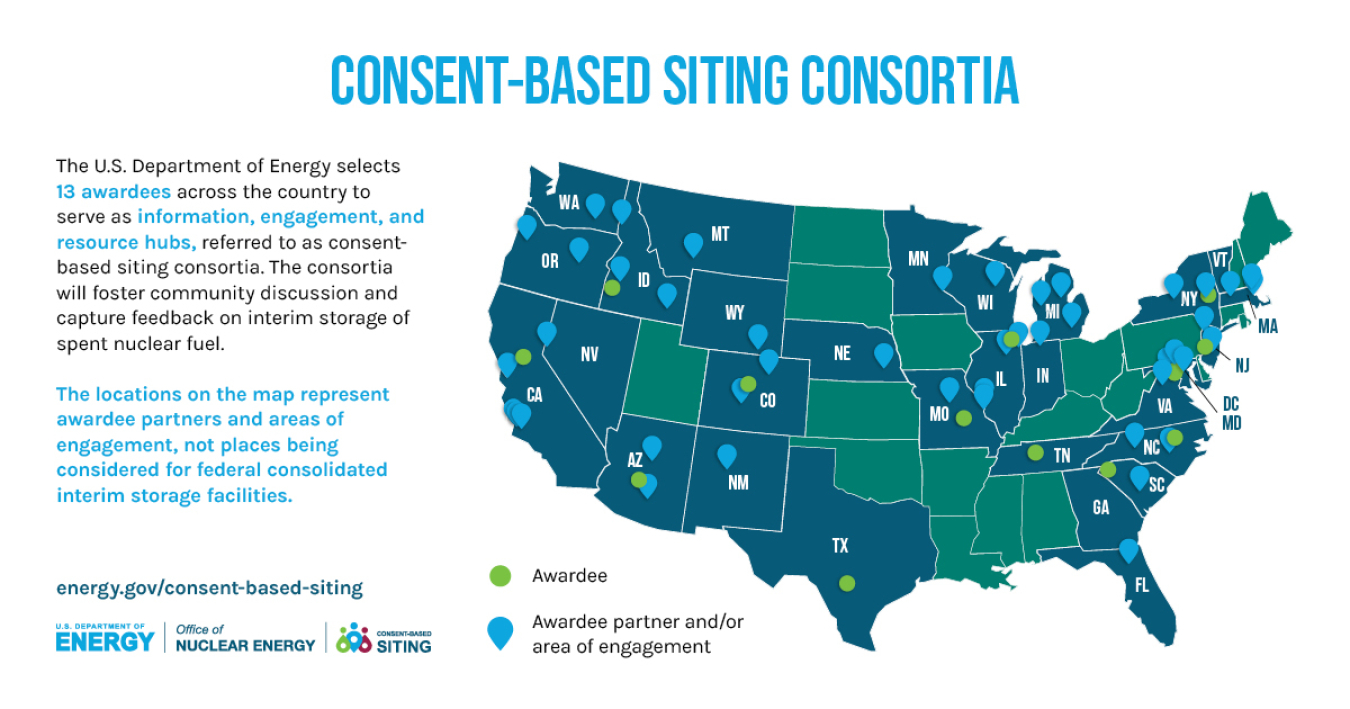 The US Department of Energy (DOE) has announced funding of $26m for groups of university, non-profit, and private-sector partners that will work with communities interested in storing and disposing of used nuclear fuel. Under its consent-based siting policy, DOE said that, along with these consortia, it will continue working with communities to ensure transparency and local support. This follows DOE’s first update to the Consent-Based Siting Process for Federal Consolidated Interim Storage of Spent Nuclear Fuel in April.
The US Department of Energy (DOE) has announced funding of $26m for groups of university, non-profit, and private-sector partners that will work with communities interested in storing and disposing of used nuclear fuel. Under its consent-based siting policy, DOE said that, along with these consortia, it will continue working with communities to ensure transparency and local support. This follows DOE’s first update to the Consent-Based Siting Process for Federal Consolidated Interim Storage of Spent Nuclear Fuel in April.
DOE is also pressing ahead with research and development for the long-term disposition of used fuel which is seen as critical to achieving clean energy goals and a net-zero economy by 2050. “It is vital that, as DOE works to be good stewards of the nation’s spent nuclear fuel, we do right by communities in the siting process and includes them in the decision-making at the outset,” said Energy Secretary Jennifer M Granholm. “This funding will help DOE learn from and involve communities across the country in the consent-based siting process, answer questions and concerns, and develop an understanding so that we are good neighbours even before moving in.”
Under the consent-based siting approach, communities participate in the process by working through a series of phases and steps with DOE, helping them to determine whether and how hosting a facility to manage used fuel is aligned with their goals. The process consists of three stages: planning and capacity building, site screening and assessment, and negotiation and implementation.
DOE is currently in the first stage and is not currently soliciting volunteer communities to host federal consolidated interim storage facilities as part of this funding opportunity.
DOE competitively selected 13 geographically and institutionally diverse awardees – representing 12 states and the District of Columbia – who will engage with additional partners and communities, expanding the impact of these awards and furthering discussion of consolidated interim storage of used fuel.
Awardees will represent a consent-based siting consortium, and will collectively help DOE facilitate engagement activities and dialogue. They will each lead inclusive community and stakeholder engagement efforts, elicit public feedback to refine strategies that support mutual learning.
The project teams will each receive about $2m and represent diverse organisations, DOE said. The project teams that will receive awards are:
- American Nuclear Society (IL) as the lead, with South Carolina Universities Research and Education Foundation (SC), Northern Arizona University (AZ), University of New Mexico (NM), and South Carolina State University (SC) as partners.
- Arizona State University (AZ)?Boise State University (ID) as the lead, with the National Tribal Energy Association, Arizona State (AZ), Colorado State (CO), Idaho State (ID), Montana State (MT), University of Idaho (ID), University of Wyoming (WY), and University of Michigan (MI) as partners.
- Clemson University (SC) as the lead, with South Carolina Universities Research and Education Foundation (SC) as partner.
- Energy Communities Alliance (DC) as the lead, with Environmental Council of the States (DC), DOE’s State and Tribal Government Working Group, National Association of Attorneys General (DC), National Conference of State Legislatures (DC), and National Governors Association (DC) as partners.?
- Good Energy Collective (CA) as the lead, with the University of Notre Dame (IN) as partner.
- Holtec International (NJ) as the lead, with University of Florida (FL), McMahon Communications (MA), Agenda Global (DC), American Nuclear Society (IL), and Nuclear Energy Institute (DC) as partners.
- Keystone Policy Center (CO) as the lead, with Social and Environmental Research Institute, GDFWatch (UK), and the National Association of Regional Councils (DC) as partners.
- Missouri University of Science & Technology (MO) as the lead, with University of Missouri - Columbia (MO), University of Illinois (IL), Massachusetts Institute of Technology (MA), University of Nevada (NV), Taylor Geospatial Institute (MO), and St. Louis University (MO) as partners.
- North Carolina State University (NC) as the lead, with the yak tityu tityu yak tilhini Northern Chumash Tribe of San Luis Obispo County and Region (CA), Mothers for Nuclear (CA), and the Tribal Consent Based Coalition – Diablo Canyon Nuclear Power Plant (CA) as partners.
- Rensselaer Polytechnic Institute (NY) as the lead, with Schenectady Foundation (NY) and Stockbridge-Munsee Community Band of Indians (WI) as partners.
- Southwest Research Institute (TX) as the lead, with Deep Isolation (CA), Westra Consulting (NE), Community Transition Planning (MI), and Prairie Island Indian Community Tribal Nation (MN) as partners.
- Vanderbilt University (TN) as the lead, with Rutgers University (NJ) and Oregon State University (OR) as partners.
Image courtesy of US DOE



